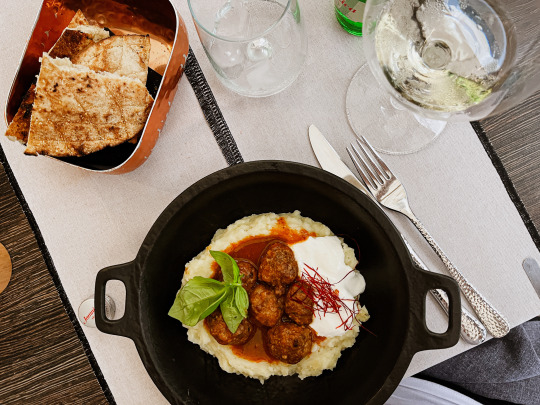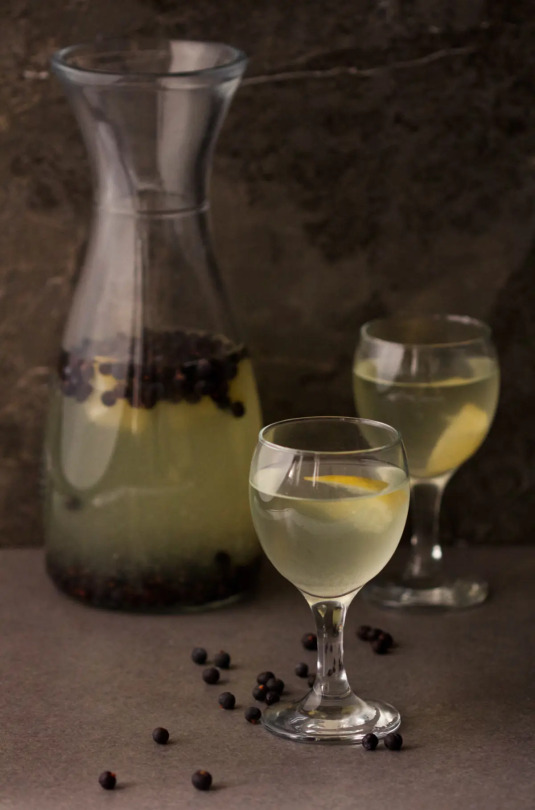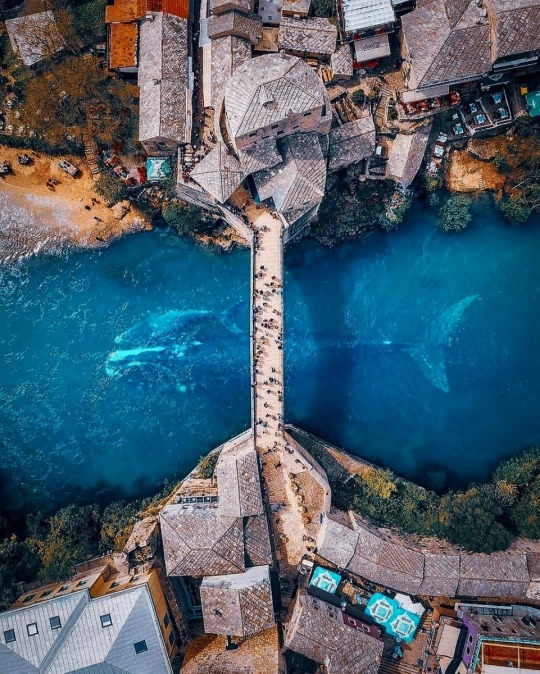#bosnian food
Explore tagged Tumblr posts
Text

Taj Mahal, Dubrovnik, Croatia. 2023
4 notes
·
View notes
Text
it seems i have attracted a lot of people on my ćevapi post
do you guys want me to go to a ćevabdžinica and take a photo of them from my cities version of it
#bosnian food#lmk cuz im gonna go with my dad to the city centre and they got such a good place for ćevapi
2 notes
·
View notes
Text
Explore Traditional Bosnian Food – Buy Online Now
Dive into the flavors of Bosnia with traditional foods like cevapi, burek, and more. Browse a wide range of authentic Bosnian dishes, snacks, and pantry essentials online. Whether you’re cooking or snacking, enjoy the true taste of Bosnian cuisine delivered to your door. For more infomation visit our site: https://mezehub.com
0 notes
Text
The Balkan Breakfast Trend: Delicious or Dangerous?
A viral TikTok trend is stirring up concerns among health experts. The Balkan breakfast, popularized by user @.dayi_, features raw peppers and tomatoes, cheese, and bread. While many have embraced this colorful meal, experts warn about its potential digestive issues. Jamie Maitland, a certified nutritionist and founder of The Office Health, expressed her worries. “I have some concerns about…
#Albanian food#Balkan Breakfast#bosnian food#Bulgarian food#Cultural Cuisine#Fiber Rich Foods#Food Trends#Greek food#gut health#healthy eating#healthy lifestyle#Jamie Maitland#Macedonian food#Montenegro food#Nutrition Tips#Organic Ingredients#tasty food#tiktok trend#traditional food#Turkish food#Viral Recipes
0 notes
Text

Ćufte u Paradajz Sosu
#food#recipe#dinner#cufte#meatballs#beef#tomatoes#marinara#paprika#parsley#basil#garlic#onions#mustard#bosnian#dairy free
50 notes
·
View notes
Text

Balkan Fermented Juniper Berry Juice / Smreka / Kleka (Vegan)
#vegan#drinks#Bosnian cuisine#Macedonian cuisine#croatian cuisine#serbian cuisine#Slovenian cuisine#balkan cuisine#juices#fermented foods#smreka#kleka#juniper berries#lemon#blackthorn berries
28 notes
·
View notes
Text
I jst wanna eat international everyday
#Indonesian? Sign me up.#Turkish? Hell fucking yeah#Indian? I'm in.#Arabic? PLEASE#russian? Mhhhhhhhhhh#I jst#Need international food#All of it#Bosnian food is top notch too#And albanian food#AAAAG JT'S JST SO GOODDDD
3 notes
·
View notes
Text
went out for drinks with my coworkers tonight for my birthday that passed, my supervisor's birthday, and just a general hangout and like.. completely unprompted, while playing on one of the silly zombie shooter games at one of the bars and holding the gun, one of my other coworkers yells out excitedly to me, "oh my god you look so butch right now! you look so masc right now oh my god!!" and like!!!!!!!! when i tell you all i'm on a gender euphoria high!!!!!!!!!!!!
#AND!!! big boss and his wife gave me a ride and we were talking on the way out about this new Bosnian restaurant#(im still tipsy and when i say that was the hardest fucking word to spell in my life........)#but we're gonna all go there together sometime and!!!!!!!!#i'm having a great night :')#had all kinds of fun food and drinks and it was just the best night#talking tag
2 notes
·
View notes
Text

While in Croatia, I was sold a quick tour to Bosnia Herzegovina. I couldn't pass up the opportunity to add another stamp to my passport. While there, I was eager to try a traditional Bosnian dish. I was served some dolma and japrak at Restauran Emen.
I didn't go by ratings. I just picked a spot before I'd be rained on. The service was adequate. The dish was delightful.
#bosnian#bosnia#bosnia herzegovina#travel#travelling#city#old town#photography#vsco#50mm#life#wanderlust#vacation#explore#iphonography#citylife#cityscape#mostar#food#foodie#foods#foodstagram#foodstyling#foodpics
4 notes
·
View notes
Text
Exploring Bosnia and Herzegovina: A Comprehensive Travel Guide
A Brief History of Bosnia and Herzegovina Bosnia and Herzegovina, nestled in the heart of the Balkans, has a rich and tumultuous history. The region was part of the Roman Empire and later the Byzantine Empire before becoming the medieval Bosnian Kingdom in the 12th century. The Ottoman Empire took control in the 15th century, influencing the culture and religion of the region significantly. In…

View On WordPress
#A Brief History of Bosnia and Herzegovina#A Brief History of Bosnia and Herzegovina Bosnia and Herzegovina#a visa is not required for stays of up to 90 days within a 180-day period. However#adventure#africa#aiming to improve standards and align with European norms. Visa Information For many nationalities#along with the Brčko District. The country continues to navigate its post-war recovery and development#and after World War II#and architectural influences that are still visible today in cities like Sarajevo and Mostar. Political Situation Today#and baklava (sweet pastry). The culture is warm and hospitable#and Banja Luka International Airport. The country has a growing infrastructure with well-maintained roads and an expanding public transporta#and Central European influences. Must-try dishes include cevapi (grilled sausages)#and cultural tours are popular activities. Q: How affordable is accommodation in Bosnia and Herzegovina? A: Accommodation is affordable#and entertainment are reasonably priced#and higher education. The country boasts several universities#and historical landmarks to learn about the rich history and culture. Safety Bosnia and Herzegovina is generally safe for tourists. However#and Jajce are top destinations. Q: What activities can tourists enjoy in Bosnia and Herzegovina? A: Hiking#and Roman Catholicism being the major religions. This diversity is reflected in the numerous mosques#and Roman Catholicism. Q: What are some traditional foods to try in Bosnia and Herzegovina? A: Cevapi#and synagogues. Food and Culture Bosnian cuisine is a delightful blend of Ottoman#and University of Mostar. Education reforms are ongoing#Blagaj#Bosnia and Herzegovina came under Austro-Hungarian rule. Following World War I#Bosnia and Herzegovina is a democratic republic with a complex political structure divided into two main entities: the Federation of Bosnia#burek#burek (filled pastry)#but it&039;s advisable to carry some cash for use in smaller towns and rural areas. Top Places to Visit Sarajevo: The capital city#but it’s good to carry some cash for rural areas. Q: What are some must-visit places in Bosnia and Herzegovina? A: Sarajevo#churches#credit and debit cards are widely accepted in cities and tourist areas
0 notes
Text

taj mahal. dubrovnik, croatia. 2023
1 note
·
View note
Text
Have any of you heard what a Tabaskino is or is this something Bosnian?


#The name makes me think it's mexican af#but idk everything online I find is Bosnian#it's very soft and has meat cheese and other good fast food stuff in it
1 note
·
View note
Text
Taste the Richness of Bosnian Food
Dive into the diverse flavors of Bosnian food, featuring dishes like cevapi, pita, and baklava. This cuisine blends influences from Eastern and Western cultures, offering a unique culinary experience. Explore traditional recipes and enjoy the hearty, flavorful dishes that Bosnian culture has to offer. Read more-https://mezehub.com

0 notes
Text

Okay, @sihatn wishes to be so hung up on the particular war crime the Israeli government is using to excessively slaughter innocent Palestinian civilians, so let’s explain the difference between Genocide, Ethnocide, and Ethnic Cleansing:
Genocide: the deliberate killing of a large number of people from a particular nation or ethnic group with the aim of destroying that nation or group
Examples: The Armenian Genocide (where the term actually originates), the Shoah/Holocaust, Ta��no Genocide, and Rwandan Genocide to name a few.
I have seen some Zionists on this platform and on Instagram argue that Israel cannot be committing Genocide because it is a “very specific instance in history that only includes the Holocaust”. That fact is ardently incorrect. For one, the first event to be called a Genocide and where the term was coined was the Armenian Genocide and countless events have been labeled a Genocide since 1943/1944 when the term was initially coined (including events coined after the fact that had already happened like the aforementioned Taíno Genocide).
Ethnocide: the deliberate and systematic destruction of the culture of an ethnic group or nation without deliberately killing large numbers of people within that ethnic group or nation
Think “kill the Indian, save the man”, the American and Canadian policy against American Indian tribes and First Nations that sought to forcibly assimilate them into W.A.S.P. culture. A similar policy occurred in Hawaii during the “Republic of Hawaii” and “Territory of Hawaii” days, and even the destruction of Yiddish Culture by Zionists in Israel who feared it for being “too Middle Eastern”. Most Re-Education camps fall in this category too.
Ethic Cleansing: the mass expulsion or killing of members of an unwanted ethnic or religious group in a society
This term is relatively new and was coined in the aftermath of the collapse of Yugoslavia and Serbia’s treatment of Croats, Bosnians, and other ethnic minorities, as well as the Stalinist movement of ethnic minorities to different SSRs.
Mass Homicide: the deliberate killing of a large number of people
The only distinction here is the people are not being killed because of their ethnicity or nation, but for ✨ other reasons ✨
Now here’s the kicker, most Zionists would say they are committing Ethnic Cleansing. They might not say it out right, because the term has a nasty connotation, but they will say they’re doing the definition of ethnic cleansing.
Some propaganda reblogging Zionists might claim that they’re just committing Mass Homicide but here’s the thing, almost every example of mass homicide being committed by one nation to another nation has been an example of one of the first three categories. The only real examples of Mass Homicide actually being Mass Homicide occur within a state (see Mao famines, Pol Pot’s mass killings, or the countless purging of communists or anti communists during the Cold War).
Some (wrong) historians may claim the Bengal Famine and Irish Potato Famine were examples of mass Homicide but here’s the thing, in both cases aid from other nations and governments were barred from entering the effected places because the UK forbid it. Food exports were forced to continue to come from Ireland and Bengal because the UK forced it. The reasons these famines were so severe was because the UK had a eugenics inspired belief that the Irish and Bengalis were “sub human animals” and “less deserving of food than the Brits”.
The Irish Potato Famine and Bengali Famine were Genocides, with famine being the preferred method of killing.
Was it intentional at first? Maybe not. Did it become intentional after the fact? Yes.
But this takes us to the most important point. The difference between Genocide, Ethnocide, and Ethnic Cleansing AND Mass Homicide is the intent.
But the intent isn’t truly known until after the fact, when internal government documents are released and the facts of the situation are holistically known.
The Jews/Poles/Romani/etc knew they were going through a Genocide (or well, they didn’t know the word, but they knew what was happening) but most of the outside world didn’t because the N@zis were secretive about it. Yes some activists and Jewish/Polish/Romani/etc diaspora groups warned other governments, but these other governments (US, UK, USSR, China, France, Brazil, Mexico, Canada, Italy even) were skeptical.
We don’t full know intent now, but given Herzl and Jabotinsky’s rhetoric which essentially established modern day Zionism and the Israeli state, and the establishment of Area C for Israeli settlement after conflict in the West Bank, the fact that Israel has threatened a Second Nakba, an event internationally acknowledged as ethnic cleansing, the fact that there are oil reserves underneath Gaza and the forcing of 2 million people into an airport sized camp would allow Israel to open up drilling where the ruins of Gaza city lay, or the fact that Israel is an Ethnonationalist country that relies on the superiority of Israelis over Palestinians and other neighbouring countries in order to exist makes the intent known to those of us familiar with the history of this conflict.
Ok ok ok ok ok here’s where I M. Night Shyamalan this whole thing: Genocide, Ethnocide, and Ethnic Cleansing are all the same crime according to multinational organizations like the United Nations. They are all Genocide.
All Ethnocides are Genocides, but not all Genocides are Ethnocides.
All Ethnic Cleansings are Genocides, but not all Genocides are Ethnic Cleansings.
The Nakba was an Ethnic Cleansing, therefore the Nakba was a Genocide.
The Netanyahu administration claims that their on going attack on Gaza is a “new Nakba”.
Nakba = Ethnic Cleansing = Genocide
The Netanyahu administration claims that their on going attack on Gaza is a “new Genocide”.
Genocide carries with it negative connotations. If the term was as widely used in 1944 as it is today, Hitler would deny genocide allegations, just as the Turkish continue to deny genocide allegations from the Armenian Genocide, why the Japanese continue to deny Genocide Allegations during their rule of Korea, Taiwan, parts of Micronesia, Manchuria, and Nanjing. Why the British refuse to acknowledge the Irish Potato Famine or Bengal Famine as Genocides. Why the conservative right want to ban the teaching of American genocides against countless groups (namely Native Americans, African Americans, Native Hawaiians, and Chicanos). And why Zionists get so offended when you refer to the actions of Israel as a Genocide.
Those who commit Genocide will never acknowledge that they are committing genocide. The fact that the current mainstream Zionist reaction, like @sihatn, is to deny that the ongoing genocide exists just proves that one is happening… if the horrific videos didn’t prove it enough (this one is from an American pro Israel source, but it doesn’t not take long to find ones from individuals in Gaza)
In conclusion, Israel is committing a genocide, and if you say otherwise, you are blinded by Ethnonationalism just like the Germans were in the 30s/40s, the Turks were during the 10s/20s and onward, the Brits were for (well forever), and the American right wing is.
If you don’t acknowledge the fact that Israel is committing a Genocide you are part of the problem shawty, and it’s not a good look 😬
#gaza strip#israel#palestine#from the river to the sea palestine will be free#gaza#gaza genocide#news on gaza#gazaunderattack#save gaza#free gaza#am yisrael chai#don’t be antisemitic just be anti genocide#genocide#ethnocide#ethnic cleansing#i stand with israel#isreal#israeli history#jewish history#jumblr#gazaunderfire#stand with gaza#anti zionisim#i stand with palestine#war on gaza#israhell#antisemitism#rwanda#hawaii#native american
426 notes
·
View notes
Text

Punjene Paprike
#food#recipe#dinner#punjene paprike#stuffed peppers#peppers#bell pepper#tomatoes#onions#garlic#vegeta#beef#rice#parsley#baking#gluten free#dairy free#bosnian
40 notes
·
View notes
Text

عَنْ أَبِي هُرَيْرَةَ ـ رضى الله عنه ـ قَالَ: " مَا عَابَ النَّبِيُّ صلى الله عليه وسلم طَعَامًا قَطُّ، إِنِ اشْتَهَاهُ أَكَلَهُ، وَإِلاَّ تَرَكَهُ." صحيح البخاري ومسلم حديث ٣٥٦٣ - ٢٠٦٤
Narrated Abu Huraira: " The Prophet (peace be upon him) never criticized any food (presented him), but he would eat it if he liked it; otherwise, he would leave it (without expressing his dislike). " Sahih al-Bukhari 3563 In-book reference : Book 61, Hadith 73 // Sahih Muslim 2064a In-book reference : Book 36, Hadith 254
ما عاب رسول الله - صلى الله عليه وسلم - طعامًا قط؛ أي: طعامًا مباحًا, أما الحرام، فكان يَعيبه ويذمه، وينهى عنه، وذهب بعضهم إلى أن العيب إن كان من جهة الخلقة، كُرِه، وإن كان من جهة الصَّنعة، لم يكره؛ لأن صنعة الله لا تُعاب، وصنعة الآدميين تعاب؛ قال الحافظ: والذي يظهر التعميم, فإن فيه كسر قلب الصانع؛ قال النووي: من آداب الطعام المتأكدة ألا يعاب, كقوله: مالح, حامض, قليل الملح, غليظ, رقيق, غير ناضج, ونحو ذلك.
((وإن كرهه، ترَكه))؛ قال ابن بطال: هذا من حسن الأدب؛ لأن المرء قد لا يشتهي الشيء ويشتهيه غيره، وكل مأذون في أكله من قِبَل الشرع، ليس فيه عيبٌ. الشرح
The Prophet never spoke badly of any food served to him. Rather, if he liked it, he would eat it, if not, he would leave it, not belittling it. Hadith Translation/ Explanation : English French Urdu Indonesian Bosnian Russian Chinese Persian Indian Kurdish Portuguese Hausa Sinhalese: https://hadeethenc.com/en/browse/hadith/4966
#حديث#أحاديث نبوية#اللهم صل وسلم على نبينا محمد#محمد صلى الله عليه وسلم#hadith#صلى الله عليه وسلم#النبي محمد صلى الله عليه و آله وسلم#الرسول صلى الله عليه وسلم#رسول الله صلى الله عليه وسلم#طعام#اكل#الأكل#الطعام#عاب#عيب#رزق#حديث الرسول#sunnah#islam#ahadeth#hadeth#muslim#hadith sahih#prophet muhammad#prophet mohammed#prophet muhammed pbuh#islamic#islamdaily#welcome to islam#food
59 notes
·
View notes